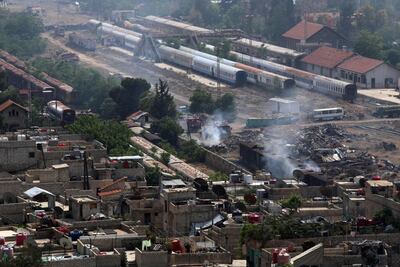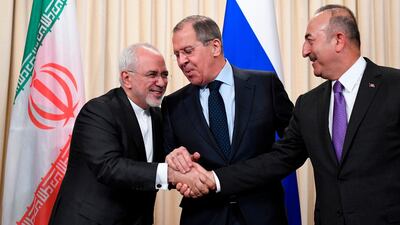Russia on Saturday accused the United States of trying to divide Syria as he met his counterparts from Iran and Turkey to push forward a Syrian peace process.
Foreign Minister Sergey Lavrov said recent US-led missile strikes on Syria had "seriously aggravated the situation", and that statements about supporting the territorial integrity of Syria "are only words that, apparently, cover plans for reformatting the Middle East and plans for dividing Syria into parts".
Mr Lavrov was meeting in Moscow with Iranian Foreign Minister Mohammad Javad Zarif and Turkish Foreign Minister Mevlut Cavusoglu for the first time since the US and its allies launched missile strikes in Syria in response to a chemical attack allegedly carried out by the Syrian government.
The incident created a rift between Russia and Iran, who support Syrian President Bashar Al Assad and condemned the strikes, and Turkey, which supports rebel groups said the response was an appropriate response to a "massacre". Russia claimed the chemical attack was staged to discredit Mr Al Assad..
However, the Russian, Iranian and Turkish foreign ministers on Saturday talked up their successes in brokering a political solution to the Syrian conflict. The three nations launched their peace attempt in the Kazakhstan capital Astana last year, which they are pursuing independently of a US and UN-backed Geneva initiative.
Mr Lavrov said the peace talks in Astana were "firmly standing on their feet" and praised the "unique" alliance between Moscow, Tehran and Ankara.
Critics of the Astana talks are "trying to show that they today decide all the affairs in our world, but fortunately their time has passed", he said.
The conflict in Syria has killed more than 350,000 people since it began in 2011. Russia, Iran and Turkey are the guarantor states in the so-called "Astana process" aimed at ending the violence.
The three agreed to intensify efforts to provide humanitarian aid in Syria.
"We will ensure that this aid is provided in the most effective way. We will be cooperating with the government, the opposition and of course with our counterparts at the United Nations, the International Red Cross, the Syrian Red Crescent and other international organisations," Mr Lavrov said.
International aid groups have repeatedly accused the Syrian government, which is closely allied with Russia and Iran, of preventing the delivery of aid to besieged, rebel-held areas.
Mr Lavrov implicitly criticised Damascus after it blocked UN humanitarian aid to the Syrian town of Douma, saying Moscow was calling for the regime to be more "flexible".
Douma was the last town fall to a government and Russian offensive in the formerly rebel-held Eastern Ghouta region near Damascus. Rebels left the town a few days after the chemical attack there on April 7, in which dozens of people were reported killed. The US, France and Britain launched a missile attack on Syrian chemical weapons facilities on April 14.
Mr Lavrov reiterated Russia's contention that the chemical weapons attack was an "artificial pretext" for the missile strikes by the US, Britain and France.
_______________
Read more:
Mattis warns of Israel-Iran military confrontation in Syria
Senior Al Qaeda-linked cleric in Syria injured in assassination attempt
Russia slammed for ‘obscene masquerade’ at OPCW
_______________
Mr Cavusoglu meanwhile criticised the United States for supporting Syria's main Kurdish militia, which played a key role in rolling back ISIS and now controls much of northern and eastern Syria. Turkey views the Kurdish fighters as an extension of the Kurdish insurgency raging in its south-east.
"Today, the US supports terrorist organisations, and this has to stop," Mr Cavusoglu said.
Meanwhile, Syria regime forces backed by air strikes and artillery fire were locked in violent clashes with ISIS south of Damascus on Saturday.
Government troops battled ISIS fighters in the neighbourhood of Qadam and nearby southern areas, the Britain-based Syrian Observatory for Human rights monitor said.
Regime forces are seeking to oust the the extremists from the capital's southern doorstep, where government bombardment has intensified since April 19.

ISIS overran Qadam last month, and has held parts of the adjacent district of Hajar Al Aswad and the neighbouring Palestinian refugee camp of Yarmouk since 2015.
"Violent clashes are ongoing between both sides in Qadam, where regime forces were able to advance in parts of its Mazaniyeh quarter," said Observatory chief Rami Abdel Rahman.
Syrian state news agency Sana said army units "are advancing on several axes in the neighbourhoods of Qadam and Mazaniyeh and extending their control over a number of buildings".
On Friday, regime forces seized control of buildings inside both Qadam and Hajar Al Aswad, the Observatory said.

